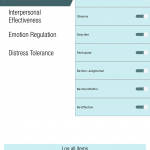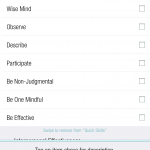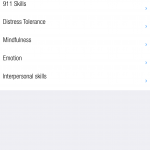DBT Diary Card is a tool practitioners can recommend to clients undergoing Dialectical Behavioral Therapy (DBT). This app allows clients to fill out and track DBT diary cards without paper and pen. With flexibility to customize skills and targets, the app enables the practitioner and client to plan according to the client’s most pressing needs. The client records skills they worked on and targets they met. This can be converted into a PDF document to share with their practitioner.
Version: 3.0 (iOS)
Compatibility: Available on all iOS devices
Price: $4.99
Target Audience: Practitioners using Dialectical Behavioral Therapy.
Bottom Line: DBT Diary Card allows users to track their use of DBT skills between clinical sessions and share their progress with practitioners.
Have you used the app? Rate it here![Total: 2 Average: 4]
Likes |
Dislikes |
|
|
Features and Options:
DBT Diary Card was created to work in combination with Dialectical Behavioral Therapy (DBT). The primary goal of the app is to help clients record skills and targets outside of therapy. Skills refer to Mindfulness, Interpersonal Skills, Emotion Regulation, and Distress Tolerance and the activities associated with building those skills. Targets refer to specific feelings, thoughts, and behaviors which the client is seeking to incorporate into their life, such as joy; or overcome, such as suicidal ideation. DBT Diary Card has five core features: “Today,” “Coaching,” “Customize,” “DBT Reference,” and “Graphics and Logs.”
The practitioner and client can customize the app to meet the client’s needs. Under Customize, the user can add or subtract skills under Mindfulness, Interpersonal Skills, Emotion Regulation, and Distress Tolerance. They can also add or subtract targets under Feelings, Thoughts, and Behaviors. The app is pre-programed with skills and targets, such as Wise Mind under Mindfulness or self-injurious thoughts under Thoughts. The app provides instructions or descriptions for each skill and target. Pre-programmed skills and targets can be hidden from the user’s diary card and new skills and targets can be added. When the practitioner and client add a new skill, the app asks for the name and description of the skill or target. Then, it appears on the user’s diary card.
The feature called Today is the user’s daily diary card. Under the Skills tab, the client can indicate whether he or she utilized a listed skill. Under the Targets tab, one can indicate which emotions they felt and the degree to which they felt them, thoughts they had and degree to which they believed them, and behaviors they acted on. Under the Notes tab, the user can enter a free-form journal entry. The user can look back on previous dates using the app’s calendar to view or edit previous days.
Coaching facilitates skill development. The user can select which skill and activity they wish to work on. A series of prompts walks them through the skill and activity chosen. Unlike the Today feature, only pre-programmed activities are available in the Coaching feature. The Coaching feature does not synchronize with the Today feature; the user must update the Today feature with their completed skill after using the Coaching feature.
Graphics and Logs makes sharing data with practitioners simple. Skills are presented through a “Diary Card Report.” The Diary Card Report provides a clear way to compare skills completed each day. Targets are presented through graphs. The user can chose which targets they wish to review, limiting the graph to one or as many as twenty targets. The app allows the user to limit the data in the Diary Card Reports and graphs with a beginning date and an end date.
Practice Implications:
DBT Diary could help educate clients on DBT and DBT skills. A practitioner using DBT could assign DBT Diary Card as a homework assignment between sessions. The practitioner could utilize the app’s graphs and charts to look back on events during the week and discuss how the client utilized DBT skills to meet their targets. The practitioner could also use the app to look for themes in relation to symptomology, thus provide targets for intervention. Reviewing skill utilization in relation to symptoms will allow the practitioner to evaluate skill effectiveness.






